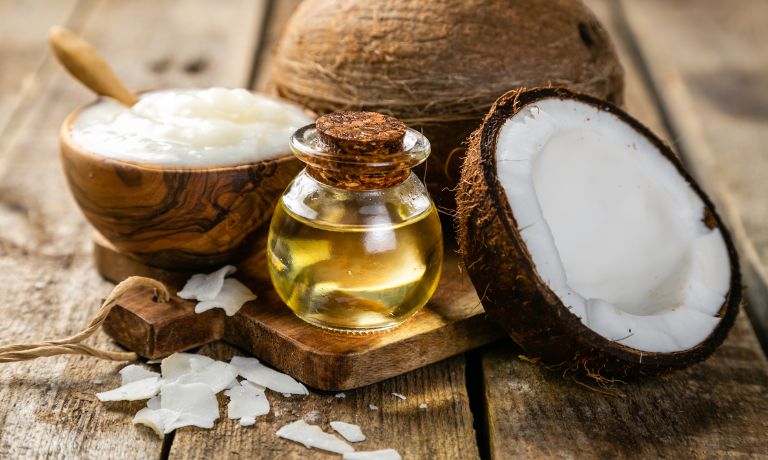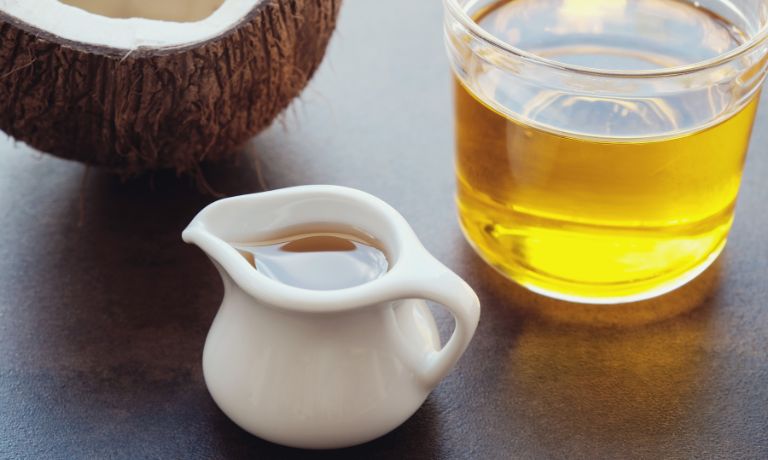One common question that often surfaces in conversations about fasting is: can I take MCT oil while fasting?
Many people like using MCT (medium-chain triglyceride) oil as part of their keto diet plan.
However, there are still questions surrounding its use when it comes to intermittent fasting.
In this blog post, we will provide an overview of what MCT oil is and look at the potential impact on different types of fasts.
What Is Mct Oil?
MCT oil is a concentrated nutritional supplement made from medium-chain triglycerides (MCTs).
They are fatty acids with shorter chains than most other dietary fats.
They’re more easily broken down and absorbed by our body, providing a quick energy source without having to be digested first.
This makes them ideal for people looking for an alternative or additional fuel sources, such as athletes or those following low-carb diets.
However, consuming too much MCT oil can lead to digestive issues such as cramps, diarrhea and nausea.
Make sure to start with a low dosage and gradually increase your intake as needed.
Be sure to consult with your doctor before starting any new supplement or dietary regimen.

Where Does Mct Oil Come From?
MCT oil is made from medium-chain triglycerides which are derived from coconut oil and other plant sources.
It’s odorless and flavorless with a transparent yellowish-brown color.
To get the most out of your MCT oil, look for one that uses high-quality ingredients and has been tested for quality control.
What Is Fasting?
Fasting is a dietary practice that involves abstaining from food and drinks for a set period of time.
It’s often used for religious or spiritual reasons, but it has also become popular in recent years as a health trend.
Fasting can range from skipping meals to complete abstinence from food and drink for up to several days at a time.
If you decide to give fasting a try, make sure you talk to your doctor first and follow their advice.

Does Mct Oil Break A Fast?
MCT oil can be consumed during a fast depending on the goals of the individual.
Those who are fasting for health reasons may find that taking MCT oil helps them feel more energized and focused.
People who are looking to lose weight may want to avoid it as it may break their fast.
In addition, it also depends on the dosage. Consuming too much MCT oil can lead to digestive issues such as cramps diarrhea and nausea.
Remember to start with a low dosage and gradually increase your intake as needed.
How Do You Use MCT Oil While Fasting?
When using MCT oil while fasting, start with a low dose and gradually increase your intake as needed.
Many people find that adding one teaspoon of MCT oil to their morning coffee or tea helps them stay energized throughout the day without breaking their fast.
If you feel like you need a little extra energy while fasting, try adding some MCT oil into smoothies or salad dressings.
It helps to add a boost of energy and nutrition without causing a dip in blood sugar levels.
Additionally, consuming protein-rich foods in combination with MCT oil will provide sustained energy and help keep you feeling full for longer periods of time.
What Are Some Types Of Fasting?
There are various types of fasting, with some being more extreme than others. Here are some different methods:
– Intermittent Fasting (IF): This type of fast involves eating for only certain hours of the day, usually 8 to 10 hours and then abstaining from food for the remaining 14 to 16 hours.
– Alternate Day Fasting (ADF): With this type of fast, you alternate between days where you eat normally and days where you restrict your calorie intake to about 500 calories.
– 24-Hour Fasts: As the name implies, this type of fasting involves abstaining from food for a full 24-hour period. This is usually done one to two times a week.
– 5:2 Diet: This type of fasting, also known as the Fast Diet, entails normally eating for 5 days in a week and limiting your calorie intake to 500 calories on the other two days.
How Does MCT Oil Work?
MCT oil works by providing a concentrated source of energy that can be quickly absorbed and used by the body.
It is composed primarily of caprylic acid (C8) and capric acid (C10).
These fatty acids are metabolized differently than other types of fats, which allows them to provide rapid energy without spiking blood sugar levels.
Additionally, MCT oil has been shown to help reduce food cravings, increase satiety levels, and improve metabolic health.

The Best Time To Take Mct Oil While Fasting
The best time to take MCT oil while fasting is in the morning before breakfast.
The reason for this is that MCTs are quickly absorbed and provide a burst of energy without spiking blood sugar levels.
Additionally, taking it on an empty stomach may help minimize any unwanted digestive side effects.
Everyone responds differently to supplements and certain individuals may experience adverse reactions when taking MCT oil during a fast.
Therefore, it’s wise to start with small amounts (less than 1 tablespoon) and gradually increase your dosage as needed or recommended by your doctor or nutritionist.
When Fasting, How Much Mct Oil?
Generally, most people take up to 1 tablespoon per day when fasting or when incorporating it into their regular diets.
However, it’s important to experiment with the amount you use to find what works best for you.
Some individuals may experience stomach discomfort or other adverse reactions when taking too much MCT oil, so it’s best to start small and gradually increase as needed.
Note that consuming more than 1 tablespoon of MCT oil per day could potentially break your fast if you’re trying to maintain a calorie-restricted state.
Therefore, if weight loss is one of your goals when implementing an intermittent fasting regimen, it’s best to limit your MCT oil intake to 1 tablespoon or less per day.
Additionally, if you are supplementing with MCT oil for its health benefits, such as increased cognitive performance, then taking more than 1 tablespoon may be beneficial.

FAQs
What Are Some Of The Benefits Of Fasting?
The benefits of fasting include weight loss, improved metabolism, and cellular repair.
Additionally, fasting can help improve mental clarity and focus, decrease inflammation, and boost energy levels.
Is Daily Use Of Mct Oil Okay?
Yes, daily use of MCT oil is generally considered safe and can be beneficial for those aiming to increase their energy levels and improve mental clarity.
However, it’s always wise to consult with a doctor or nutritionist prior to making any drastic changes to your diet or lifestyle.
Are There Any Side Effects To Taking Mct Oil?
Yes, some people may experience stomach discomfort when taking MCT oil.
Additionally, individuals with existing health conditions such as diabetes should consult with a doctor before introducing MCT oil into their diets.
Does Mct Oil Reduce Inflammation?
Yes, MCT oil has been shown to help reduce inflammation in the body due to its anti-inflammatory properties.
Additionally, studies have suggested that supplementing with MCT oil can improve gut health and boost energy levels.
Can I Take Other Supplements While Fasting?
Yes, you can take other supplements while fasting depending on your individual needs and goals.
However, it’s important to note that some supplements may contain calories or interfere with the desired effects of fasting.
It’s best to consult with a doctor before making any drastic changes to your diet or lifestyle.
What Time of Day Should You Take Mct Oil?
Generally, it’s best to take it with a meal or snack in order to maximize its benefits.
Additionally, taking it on an empty stomach may help minimize any unwanted digestive side effects.
How Should I Use Mct Oil In My Diet?
MCT oil can be used in a variety of ways, such as adding it to smoothies, shakes, or coffee.
Additionally, you can use it as a cooking oil for sautéing vegetables or baking goods.
Are Mct Oil Safe?
Yes, MCT oil is generally considered safe when used in appropriate amounts.
However, it’s always wise to consult with a doctor or nutritionist prior to making any drastic changes to your diet or lifestyle.

What Are The Best Sources Of Mct Oil?
The best sources of MCT oil include coconut and palm oils, as well as certain dairy products like cheese and yogurt.
Additionally, many health food stores carry supplements containing MCT oil that can be taken orally.
Does Mct Oil Aid in Weight Loss?
Yes, MCT oil has been shown to help support weight loss by increasing fat metabolism and energy levels.
Additionally, supplementing with MCT oil may help reduce cravings and improve satiety between meals.
Should I Take Mct Oil Before Or After A Workout?
Generally, it’s best taken before or during a workout for an energy boost, or afterward as part of a recovery snack.
Additionally, taking it with food can help minimize any digestive side effects.
Conclusion
Overall, by properly incorporating MCT oil into your lifestyle, you can experience numerous health benefits from this powerful supplement.
With its anti-inflammatory properties and ability to provide energy and support weight loss efforts, there are many potential advantages associated with taking MCT oil regularly.
Just remember to take it responsibly and consult with a doctor beforehand for proper guidance in order to maximize its benefits!

